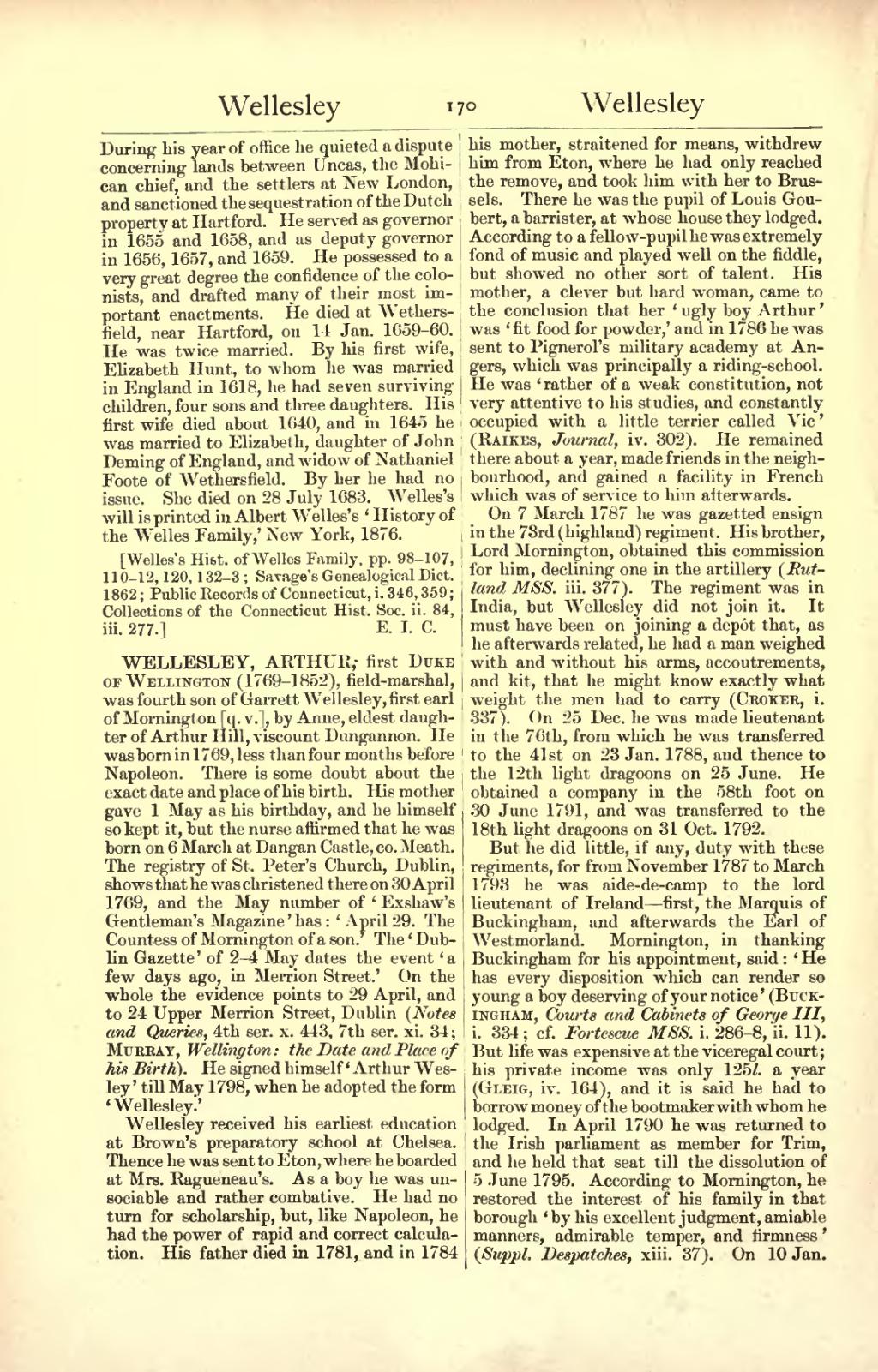During his year of office he quieted a dispute concerning lands between Uncas, the Mohican chief, and the settlers at New London, and sanctioned the sequestration of the Dutch property at Hartford. He served as governor in 1655 and 1658, and as deputy governor in 1656, 1657, and 1659. He possessed to a very great degree the confidence of the colonists, and drafted many of their most important enactments. He died at Wethersfield, near Hartford, on 14 Jan. 1659-60. He was twice married. By his first wife, Elizabeth Hunt, to whom he was married in England in 1618, he had seven surviving children, four sons and three daughters. His first wife died about 1640, and in 1645 he was married to Elizabeth, daughter of John Deming of England, and widow of Nathaniel Foote of Wethersfield. By her he had no issue. She died on 28 July 1683. Welles's will is printed in Albert Welles's 'History of the Welles Family,' New York, 1876.
[Welles's Hist. of Welles Family, pp. 98-107, 110-12, 120, 132-3; Savage's Genealogical Dict. 1862; Public Records of Connecticut, i. 346, 359; Collections of the Connecticut Hist. Soc. ii. 84, iii. 277.]
WELLESLEY, ARTHUR, first Duke of Wellington (1769–1852), field-marshal, was fourth son of Garrett Wellesley, first earl of Mornington [q. v.], by Anne, eldest daughter of Arthur Hill, viscount Dungannon. He was born in 1769, less than four months before Napoleon. There is some doubt about the exact date and place of his birth. His mother gave 1 May as his birthday, and he himself so kept it, but the nurse affirmed that he was born on 6 March at Dangan Castle, co. Meath. The registry of St. Peter's Church, Dublin, shows that he was christened there on 30 April 1769, and the May number of 'Exshaw's Gentleman's Magazine' has: 'April 29. The Countess of Mornington of a son.' The 'Dublin Gazette' of 2-4 May dates the event 'a few days ago, in Merrion Street.' On the whole the evidence points to 29 April, and to 24 Upper Merrion Street, Dublin (Notes and Queries, 4th ser. x. 443, 7th ser. xi. 34; Murray, Wellington: the Date and Place of his Birth). He signed himself 'Arthur Wesley ' till May 1798, when he adopted the form 'Wellesley.'
Wellesley received his earliest education at Brown's preparatory school at Chelsea. Thence he was sent to Eton, where he boarded at Mrs. Ragueneau's. As a boy he was unsociable and rather combative. He had no turn for scholarship, but, like Napoleon, he had the power of rapid and correct calculation. His father died in 1781, and in 1784 his mother, straitened for means, withdrew him from Eton, where he had only reached the remove, and took him with her to Brussels. There he was the pupil of Louis Goubert, a barrister, at whose house they lodged. According to a fellow-pupil he was extremely fond of music and played well on the fiddle, but showed no other sort of talent. His mother, a clever but hard woman, came to the conclusion that her 'ugly boy Arthur' was 'fit food for powder,' and in 1786 he was sent to Pignerol's military academy at Angers, which was principally a riding-school. He was 'rather of a weak constitution, not very attentive to his studies, and constantly occupied with a little terrier called Vic' (Raikes, Journal, iv. 302). He remained there about a year, made friends in the neighbourhood, and gained a facility in French which was of service to him afterwards.
On 7 March 1787 he was gazetted ensign in the 73rd (highland) regiment. His brother, Lord Mornington, obtained this commission for him, declining one in the artillery (Rutland MSS. iii. 377). The regiment was in India, but Wellesley did not join it. It must have been on joining a depot that, as he afterwards related, he had a man weighed with and without his arms, accoutrements, and kit, that he might know exactly what weight the men had to carry (Croker, i. 337). On 25 Dec. he was made lieutenant in the 76th, from which he was transferred to the 41st on 23 Jan. 1788, and thence to the 12th light dragoons on 25 June. He obtained a company in the 58th foot on 30 June 1791, and was transferred to the 18th light dragoons on 31 Oct. 1792.
But he did little, if any, duty with these regiments, for from November 1787 to March 1793 he was aide-de-camp to the lord lieutenant of Ireland—first, the Marquis of Buckingham, and afterwards the Earl of Westmorland. Mornington, in thanking Buckingham for his appointment, said: ' He has every disposition which can render so young a boy deserving of your notice' (Buckingham, Courts and Cabinets of George III, i. 334; cf. Fortescue MSS. i. 286-8, ii. 11). But life was expensive at the viceregal court; his private income was only 125l. a year (Gleig, iv. 164), and it is said he had to borrow money of the bootmaker with whom he lodged. In April 1790 he was returned to the Irish parliament as member for Trim, and he held that seat till the dissolution of 5 June 1795. According to Mornington, he restored the interest of his family in that borough 'by his excellent judgment, amiable manners, admirable temper, and firmness' (Suppl. Despatches, xiii. 37). On 10 Jan.
